- Home
- Marge Piercy
City of Darkness, City of Light Page 8
City of Darkness, City of Light Read online
Page 8
Her ability to read had greatly improved. She enjoyed reading novels, Gothic tales full of randy evil monks and lecherous uncles plotting incest in ancient castles. She read Rousseau, like everybody else. There was a man who dared to bare his soul. She read Diderot and Voltaire. She would have liked to read the Encyclopedia, but she could only carry slim volumes that fit into her pockets or her muff.
She read little paperbound books meant for peasant women and servants, but she also read books meant for the bourgeoisie. It satisfied a hunger that even the traveling didn’t sate, the hunger to understand the world, to know why things were as they were, how they got that way, how it was in other lands and times. She read about Joan of Arc. There was a woman who strapped on armor and went to battle, out-generaling the men. She read about hot air balloons, electricity, mesmerism, animal magnetism, the war with the English, the new world, how the Americans had with the help of Lafayette overthrown the British and made themselves free. She read about Catherine the Great and how she ruled Russia as what Diderot called an Enlightened Despot. She wondered if the peasants considered Catherine enlightened. It was interesting to hear about a woman wielding power.
The other women sometimes read romantic novels. Mme Abiel read the lives of saints, full of gory illustrations. But everyone in the company, women and men, thought it was peculiar of her to read serious books meant for men. Collot told her she would cook her brains. She would lose her beauty and her female nature if she overused her naturally weak brain, he explained kindly. She didn’t bother arguing. She simply bought books and read them.
Sometimes she imagined being involved with one of her intellectual heroes. Voltaire and Diderot had gone to prison for what they had written, but they were dead or dying. Abbé Raynal had written bravely and been sent into exile, but he was an old man. What she would like would be a man just her age as smart and iconoclastic as those Encyclopedists. Maybe he would write plays about justice and freedom, and she would act in them. That would be far more interesting than fainting in the arms of Collot the robber chief. Then she would say the lines with real passion. She imagined plays that would speak to ordinary people—like herself—but plays that dealt with real trouble and real pain and real anger would be censored. Still, she could imagine such a theater, even if she would never act in it.
NINE
Max
(1782–1787)
AUGUSTIN entered into Louis-le-Grand on the same Bishop’s scholarship, while Max returned to his hometown to set up housekeeping with his surviving sister Charlotte. They lived modestly, circumscribed by their lack of money. It was a humble choice to return to this stuffy town where he had always been viewed as a demi-bastard of dubious family, but he saw no way to advance in Paris. He had a duty to his surviving family and something to prove.
“Max,” Charlotte said, “they will all come to respect and admire you. They have to! You’ll win over the town fathers. In the meantime, what would you like for supper?” She beamed at him hopefully, tugging on her apron.
He shrugged. “Something simple. Soup and bread.”
He loved his routine. Never had his life been under his own control. Since his mother died and his father fled, he had lived on the sufferance, the charity of others. Now he could set his hours, the way everything was arranged, the food. He liked to eat lightly. He was addicted to coffee and morning chocolate, for both clarified his mind. Otherwise he drank watered wine and ate mostly fruit and bread. With his sister as housekeeper he could get away with reading at the table. Often he had no idea what he had eaten, only that it was soup and not obnoxious.
He had control of his appearance too. No more shabby clothes worn until they rotted. He acquired a wardrobe suitable to his new station. He believed in being clean, crisp, elegant in an understated and never ostentatious way: he cared deeply that everything should be correct. It gave him confidence, visible credentials in the form of a silk suit, a striped vest, a fine shirt with lace ruffles, silk stockings. He had the hairdresser in every morning he went to court to comb, curl and powder his hair. It took an hour, for he was fastidious that no one should feel superior to him on the grounds of appearance. His manners were meticulous. When he looked in the mirror, he was reassured. It was not that he was vain about his face or body, but he was comforted by the totally unobjectionable appearance he created.
He took daily walks. They socialized with other young bourgeois. He belonged to the local literary society that dined together and read their poetry. He entered essay contests, as did all ambitious young men trying to make a name. That was how his hero Jean-Jacques Rousseau had first made his mark. He wrote poetry to young women with whom he dutifully flirted at social gatherings. Women liked him as a dance partner, since he was deft and did not tread on their feet. It was less work than making conversation.
Charlotte pouted. “That Mademoiselle Laporte was making eyes at you.”
“I didn’t notice.”
“You’ll marry her or one of those other hussies and I’ll be alone.”
“Charlotte, I’m in no hurry to marry, I assure you.” People seemed to assume he would marry, and he supposed he would, although he thought Charlotte was fine as his housekeeper. She was not bright and she was prone to be possessive, but it did not take a great deal of brain power to shop in the market for apples and pears, to get soup on the table, to have his shirts washed and pressed. He left it up to her to find herself a husband or not, for he could not yet afford a dowry. Some women of good families seemed to find him attractive. He liked one, then another, but none well enough to do more than compose verse about their beauty and kindness, send them copies of his more interesting legal briefs, dance and carry on the decorous and tedious flirtation they expected.
He worked over his briefs again and again. He was aware that sometimes the other advocates thought he overprepared, but he believed in doing the best job possible for every client. It was a matter of respect, for himself, for the clients who depended on him to assuage wrongs or set them free. He was delighted to be an adult finally, although sometimes he felt as if he were pretending, and he would be caught and sent back to the Fathers at Louis-le-Grand. The more he established rules and patterns and habits, the safer he felt in their little house. An anger both hot and cold gripped him when he felt an edge of contempt from his peers, when he watched what happened to poor people the courts rolled over. What could he do except work ever harder and more meticulously?
There was one law for the nobles and the rich and another for the poor. When the poor came into court, punishment was automatic. They would die or go to the galleys, for the crime of being accused. It was a matter of making an example of someone who did not count, so it did not matter if the wretch was guilty or innocent. One of the worst felonies was banding together to commit any crime, even the theft of a shirt. That meant a painful lingering death in public. The wheel. The courts were terrified that peasants would organize into gangs and attack, not each other, but the local lord. Although it had not happened in a century and a half, that fear never dissipated.
He observed his society but kept his ideas to himself. With whom would he share them? Perhaps with Augustin, when he finished school. Max entertained a pleasing fantasy that he and his younger brother would set up practice together, sharing cases and ideas.
His first really interesting case involved a retired lawyer, who had built himself a lightning rod after the one invented by Benjamin Franklin, and then been forced by his neighbors and the town to remove it out of superstitious fear it would bring the lightning down. It was Max’s first chance to make a name, and he played it to the hilt. He was no orator. His voice tended to rise shrilly at the end of sentences he had been told were overly long. Still, he reasoned densely and passionately, and people paid attention. So did the judges, for he won handily. The case was written up in the Paris papers. He sent his brief to Benjamin Franklin in Paris. The local intellectuals made a fuss about him. He was invited to speak here and there.
&nb
sp; Then a monk, treasurer of the Abbey, accused a carpenter of stealing money. Max discovered that the man’s sister Clementine, a laundress at the Abbey, had repulsed the advances of the monk. This case was bitterly fought. The monk was represented by a lawyer who had recommended Max to the local bar. Max worried that he might annoy his former sponsor; nonetheless he was glad to demonstrate his independence, as much to himself as to anyone else. He did not like to think he was a man who could be bought for a little patronage. Besides, the monk was guilty and his client was not; justice had to be done. Clementine was a good woman and should be protected. It was pleasant to play her protector.
Thus over the next few years, he marched along, sometimes having more cases and sometimes less. He was regarded as a fine pleader, but he did not attract wealthy or important clients. He was not accepted into the upper ranks of Arras society. Would he always be trying to make himself heard not so much in a vacuum as in a great pillow stuffed with dusty old goose down? Arras was conservative, petty, mean. No amount of talent displayed in the courts would make up for his lack of family. The people who looked to him were the little people, whose champion he had become. Perhaps he would have to marry into one of the established professional families to improve his position.
One local belle, Mlle Deshorties, a distant cousin, seemed pleasant. He would not mind marrying her. He paid her court, not assiduously but competently. They reached a sort of understanding, but nothing was signed. She was hoping he would do better financially before they agreed. She had a sweet singing voice, was undemanding as a partner in conversation. She liked animals and children. He thought that a sign of virtue in a woman. She had copious brown hair, large nearsighted aquamarine eyes that were her most striking feature. She could make him a satisfactory wife.
He met an interesting army man, an engineer by the name of Carnot, who asked him to take on the case of an old servant woman who was being bilked. Max won the case. He and Carnot remained friendly. They discussed the American revolution and the rights of man. Then a group of peasants came to him with a grievance against their landlord, the Bishop of Arras—his benefactor.
Max hesitated. He did not want to offend the Bishop, but he could not turn back from justice because the case was not in his own best interest. He would despise himself if he allowed his personal advantage to get in the way of his moral decision. The Bishop was behaving badly. He was using his power to mistreat peasants and force them off land they had a right to, having farmed it for generations. Moreover, they could not survive without that land. The Bishop was in the wrong. Max would prove it. He took the case.
TEN
Pauline
(1787)
PAULINE usually liked fall. The streets stank less. Like most common people, she and Papa bought river water, and in the summer, it was dirty and sometimes had an odor. In fall, everything felt cleaner. The air began to smell of wood smoke. Everywhere sawyers were working, loosing the scent of oak and pine. Carts were dumping wood in the narrow streets. They took the right of way and everybody must watch out for them.
That was how the catastrophe happened. Her father was delivering chocolate to a customer who was very particular about his breakfast cocoa and must have the sugar pulverized into the powdered chocolate so that he need only add hot water. Papa was carrying a great jar full of the mixture and several boxes of made-up bonbons he was delivering as gifts from gentlemen to ladies. He had turned into a little street in the Marais and was looking at a building facade when a carter backed up and discharged a load of wood without looking. Her father was struck in the head and killed instantly. It was after dark and she was worrying what had happened to him when a constable came and told her to fetch the body.
Papa’s funeral was large. He had been popular in the neighborhood, and people wanted to show respect. Her boyfriend Henri sat beside her and put his arm around her shoulders, to comfort her and to stake a claim. She was on her own now, proprietor of the business. She was twenty and could get married anytime. Henri was apprenticed to a hat maker, so he wasn’t supposed to marry until he served out his time with his master, who lived four streets over. Now Henri had to decide whether to continue with the hat maker or to take over the chocolate business. She would prefer he came in with her. It was hard to run the business alone. She would have to hire someone to help. She missed Papa all the time in the shop. She was sleeping alone in the big double bed. Henri and she made love in that bed, but he could not sleep there. He had to be back at his master’s for the night.
She sold off her father’s few clothes to Victoire, the old-clothes woman, except for a shirt she gave Henri. It was tight on him but in good shape. She was an orphan now. She prayed fervently for the souls of her parents. She knelt trying to pray for Papa’s soul, and all she could imagine was a bird like the stained glass window with the pigeon they said was the Holy Ghost. The church was damp. She could smell the chocolate on herself. Henri said it made him feel he could eat her up.
Henri she had known her whole life, but they had only become sweethearts the year she turned eighteen. His family had always lived across the street on the third floor of the building with the crooked door. One Sunday afternoon in May she had gone with a crowd from the neighborhood out along the river to Port Bernard to eat fish stew, drink cheap country wine and dance. Suddenly they had been dancing only with each other and suddenly they had looked into each other’s eyes and then they were kissing by the river. They went out in a little boat and sang silly songs together. She had been as happy as if she was drunk.
They had been lovers for a year. The first time had been bad. She had not wanted to, but he had been out of control. It had happened in the shop while her father was making a big delivery. He had taken her on the floor, with an old rug under them. She cried afterward. He apologized and told her he loved her again and again. Then she had got used to it and began to like what they did. Papa had accepted Henri as her fiancé. If he weren’t apprenticed, he could marry her right away, but as it was, they had to wait.
She said to her girlfriend Babette, “When I’m married, I’ll have to cook and keep his clothes clean. It’s a lot of work!”
“Of course you’ll get married to Henri, but what’s the hurry?” Babette rolled her eyes. “In the meantime, let’s have a little fun. Now you have the pleasure of him and none of the labor.”
Henri and she strolled out to the suburbs every Sunday or walked along the Seine. Making plans was fun, but neither was in a hurry to put them into practice. They were careful. He pulled out of her before he came and she washed herself inside. If she got pregnant, then they would have to figure out very fast what to do, but she got thinner instead, with all the extra work. She began to wish that Henri would make up his mind. She had a boy helping, but he was only eleven and could not lift anything nearly as heavy as she could. He was fast with the deliveries but could not carry much.
Henri was a hand taller than Pauline and stoutly built, with broad shoulders and big knuckled hands. He could lift and bear heavy loads. His back and shoulders were muscular. He had dark grey-blue eyes, fine light brown hair. His features were all slightly squared, his chin, his nose, the line of his brows, his mouth, as if he had been built by a carpenter with a good level. The touch of his hands was surprisingly deft. He had a light tread for such a sturdy man. She could always recognize his step.
She got lonely with just her little helper for company. She had grown up in a family business, and now she had no family. She had two particular pals, Aimée, who was married, a year older than Pauline, with one little boy. Aimée made coffee and sold it on a street corner every morning and noon. She had a station near the Pont Neuf, highly desirable because of the traffic. Babette was unmarried and exactly her age. Babette worked in the tavern her parents owned, the Dancing Badger, just around the corner. Pauline was closest to Babette. Babette was not an orphan but she too had a boyfriend and they were sleeping together, going to be married, but who knew when. Aimée was no good to talk to, f
or she always said they should get married at once.
Henri’s parents did not want him to quit the apprenticeship. They had paid his initial fee to his master. They thought making hats was a safer business than chocolate, which they considered a fashion of the wealthy that would pass and leave Pauline without a viable business.
Pauline had a fair amount of freedom. There was no one to boss her but the gossip of her neighbors and the opinion of the neighborhood. When she was dealing with anyone from outside her little sphere, she pretended to be married. It was unusual, illegal, for a young woman to run her own business. She was supposed to be overseen by some man—husband, father, uncle, brother. She told the cafes she delivered to and the private customers that she was a married woman whose husband had been injured. He kept the books, she told them, yes, her husband Henri Léon. While she longed to have Henri help her in the shop, she was aware that once he had moved in, her life would change radically. He would want to know why she was wasting time in the street talking about the price of bread and reading together a clandestine pamphlet that talked about freedom and cheap bread for all. Often by the light of a candle late in the shop, she consumed little romances and political tracts that peddlers sold, the way her women customers consumed chocolates. She did not want to be told she was wasting precious money or time on such trifles.
Every day she changed her mind. She was angry with herself for shifting her desires and annoyed with Henri because he was just as uncertain. She’d known him since they were four. She liked the love-making in the soft bed with its green hangings in the room behind the shop with the window and a mirror her mother had been proud of. Papa had bought it for Maman when they were married. Many times Henri and Pauline looked at themselves in it, posing together. It was set up to reflect the light from the window and make the room lighter. She wanted Henri, of course, of course, but marriage could wait a little longer.

 Woman on the Edge of Time
Woman on the Edge of Time The Cost of Lunch, Etc.: Short Stories
The Cost of Lunch, Etc.: Short Stories Made in Detroit: Poems
Made in Detroit: Poems Sleeping With Cats
Sleeping With Cats Moon Is Always Female
Moon Is Always Female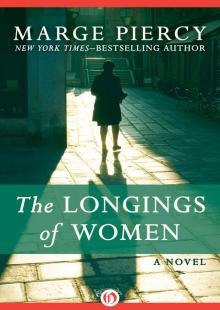 The Longings of Women
The Longings of Women Circles on the Water
Circles on the Water Summer People
Summer People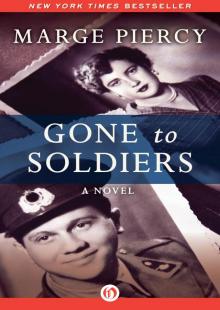 Gone to Soldiers: A Novel
Gone to Soldiers: A Novel The Hunger Moon: New and Selected Poems, 1980-2010
The Hunger Moon: New and Selected Poems, 1980-2010 Vida
Vida Fly Away Home
Fly Away Home He, She and It
He, She and It So You Want to Write
So You Want to Write Small Changes
Small Changes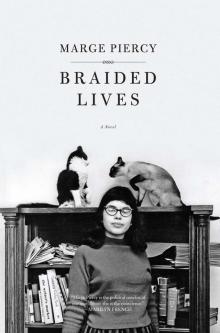 Braided Lives
Braided Lives Lord Valentine's Castle
Lord Valentine's Castle Dance the Eagle to Sleep
Dance the Eagle to Sleep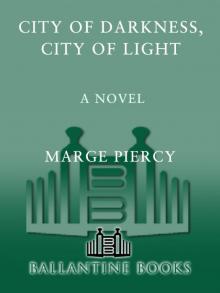 City of Darkness, City of Light
City of Darkness, City of Light The High Cost of Living: A Novel
The High Cost of Living: A Novel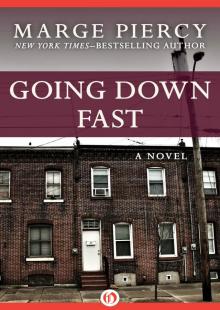 Going Down Fast: A Novel
Going Down Fast: A Novel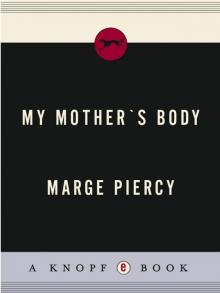 My Mother's Body
My Mother's Body Storm Tide
Storm Tide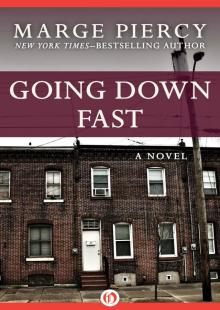 Going Down Fast
Going Down Fast The Third Child
The Third Child The Hunger Moon
The Hunger Moon The Cost of Lunch, Etc.
The Cost of Lunch, Etc. Sex Wars
Sex Wars The High Cost of Living
The High Cost of Living Made in Detroit
Made in Detroit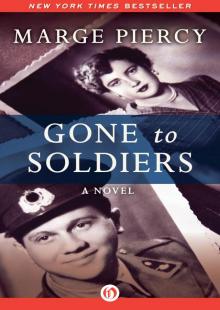 Gone to Soldiers
Gone to Soldiers